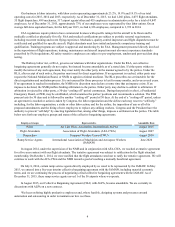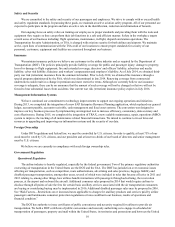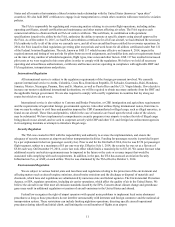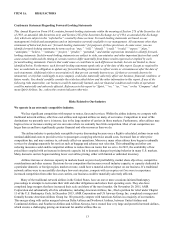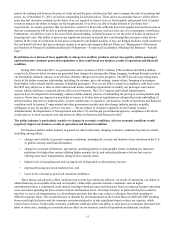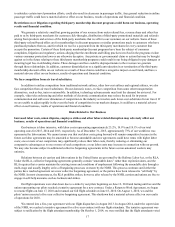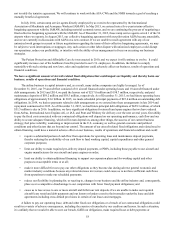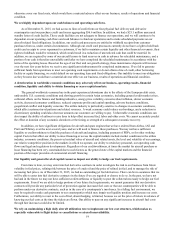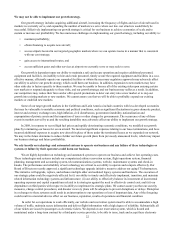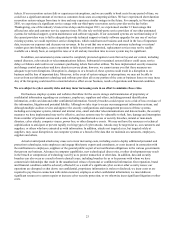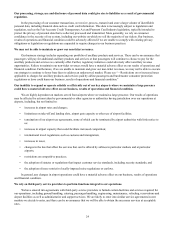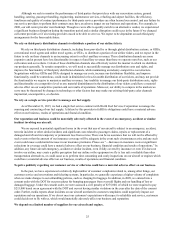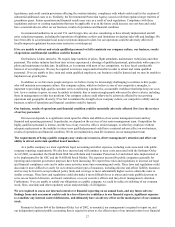Spirit Airlines 2015 Annual Report Download - page 19
Download and view the complete annual report
Please find page 19 of the 2015 Spirit Airlines annual report below. You can navigate through the pages in the report by either clicking on the pages listed below, or by using the keyword search tool below to find specific information within the annual report.19
otherwise cover our fixed costs, which would have a material adverse effect on our business, results of operations and financial
condition.
We are highly dependent upon our cash balances and operating cash flows.
As of December 31, 2015, we had access to lines of credit from our four physical fuel delivery and derivative
counterparties and our purchase credit card issuer aggregating $56.6 million. In addition, we had a $25.1 million unsecured
standby letter of credit facility. These credit facilities are not adequate to finance our operations, and we will continue to be
dependent on our operating cash flows and cash balances to fund our operations and to make scheduled payments on our
aircraft related fixed obligations. In addition, our credit card processors are entitled to withhold receipts from customer
purchases from us, under certain circumstances. Although our credit card processors currently do not have a right to hold back
credit card receipts to cover repayment to customers, if we fail to maintain certain liquidity and other financial covenants, their
rights to holdback would be reinstated, which would result in a reduction of unrestricted cash that could be material. In
addition, we are required by some of our aircraft lessors to fund reserves in cash in advance for scheduled maintenance, and a
portion of our cash is therefore unavailable until after we have completed the scheduled maintenance in accordance with the
terms of the operating leases. Based on the age of our fleet and our growth strategy, these maintenance deposits will increase
over the next few years before we receive any significant reimbursement for completed maintenance. If we fail to generate
sufficient funds from operations to meet our operating cash requirements or do not obtain a line of credit, other borrowing
facility or equity financing, we could default on our operating lease and fixed obligations. Our inability to meet our obligations
as they become due would have a material adverse effect on our business, results of operations and financial condition.
A deterioration in worldwide economic conditions may adversely affect our business, operating results, financial
condition, liquidity and ability to obtain financing or access capital markets.
The general worldwide economy has in the past experienced downturns due to the effects of the European debt crisis,
unfavorable U.S. economic conditions and slowing growth in certain Asian economies, including general credit market crises,
collateral effects on the finance and banking industries, energy price volatility, concerns about inflation, slower economic
activity, decreased consumer confidence, reduced corporate profits and capital spending, adverse business conditions,
geopolitical conflict and liquidity concerns. The airline industry is particularly sensitive to changes in economic conditions,
which affect customer travel patterns and related revenues. A weak economy could reduce our bookings, and a reduction in
discretionary spending could also decrease amounts our customers are willing to pay. Unfavorable economic conditions can
also impact the ability of airlines to raise fares to help offset increased fuel, labor and other costs. We cannot accurately predict
the effect or duration of any economic slowdown or the timing or strength of a subsequent economic recovery.
In addition, we have significant obligations for aircraft and spare engines that we have ordered from Airbus, IAE and
Pratt and Whitney over the next several years, and we will need to finance these purchases. We may not have sufficient
liquidity or creditworthiness to fund the purchase of aircraft and engines, including payment of PDPs, or for other working
capital. Factors that affect our ability to raise financing or access the capital markets include market conditions in the airline
industry, economic conditions, the perceived residual value of aircraft and related assets, the level and volatility of our earnings,
our relative competitive position in the markets in which we operate, our ability to retain key personnel, our operating cash
flows and legal and regulatory developments. Regardless of our creditworthiness, at times the market for aircraft purchase or
lease financing has been very constrained due to such factors as the general state of the capital markets and the financial
position of the major providers of commercial aircraft financing.
Our liquidity and general level of capital resources impact our ability to hedge our fuel requirements.
From time to time, we may enter into fuel derivative contracts in order to mitigate the risk to our business from future
volatility in fuel prices, refining risk between the price of crude oil and the price of refined jet fuel, and to manage the risk of
increasing fuel prices. As of December 31, 2015, we had no outstanding jet fuel derivatives. There can be no assurance that we
will be able to enter into fuel derivative contracts in the future if we are required or choose to do so. In the past, we have not
had and in the future we may not have sufficient creditworthiness or liquidity to post the collateral necessary to hedge our fuel
requirements. Even if we are able to hedge portions of our future fuel requirements, we cannot guarantee that our derivative
contracts will provide any particular level of protection against increased fuel costs or that our counterparties will be able to
perform under our derivative contracts, such as in the case of a counterparty’s insolvency. In a falling fuel environment, we
may be required to make cash payments to our counterparties which may impair our liquidity position and increase our costs.
Furthermore, our ability to react to the cost of fuel, absent hedging, is limited, because we set the price of tickets in advance of
knowing our fuel costs at the time the tickets are flown. Our ability to pass on any significant increases in aircraft fuel costs
through fare increases could also be limited.
We rely on maintaining a high daily aircraft utilization rate to implement our low cost structure, which makes us
especially vulnerable to flight delays or cancellations or aircraft unavailability.


